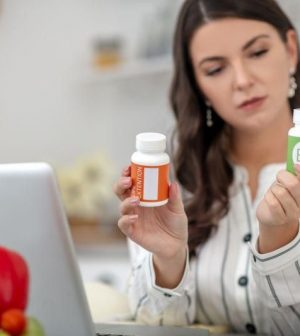- Could Your Grocery Store Meat Be Causing Recurring UTIs?
- Are You Making This Expensive Thermostat Error This Winter?
- Recognizing the Signs of Hypothyroidism
- 10 Strategies to Overcome Insomnia
- Could Artificial Sweeteners Be Aging the Brain Faster?
- Techniques for Soothing Your Nervous System
- Does the Water in Your House Smell Funny? Here’s Why
- Can a Daily Dose of Apple Cider Vinegar Actually Aid Weight Loss?
- 6 Health Beverages That Can Actually Spike Your Blood Sugar
- Treatment Options for Social Anxiety Disorder
Dietary Supplements Used by Most Adults, One-Third of Kids: Survey

Taking vitamins may drain your wallet without helping your health, yet a new government survey shows most American adults take them, as do about one-third of children.
Researchers who were led by Suruchi Mishra, from the U.S. National Center for Health Statistics, found vitamin use was common from 2017 to March 2020, prior to the pandemic when vitamin use may have even increased.
“It’s promoted as a natural product. It’s promoted as something that is different than what you’re going to get from your doctor, and the notion is that there’s no side effects because it’s all natural, and therefore it can only do good and can never do harm,” Dr. Paul Offit, a doctor at Children’s Hospital of Philadelphia, told CNN. “You can’t beat that,” added Offit, who is also the author of Do You Believe in Magic? Vitamins, Supplements, and All Things Natural: A Look Behind the Curtain.
In reality, there is “insufficient evidence” to recommend for or against taking a multivitamin with folic acid, antioxidant combination vitamins or individual supplements for vitamins A, C or E to prevent cancer or heart disease in someone who is healthy but not pregnant, according to the U.S. Preventive Services Task Force (USPSTF).
An exception may be vitamin D: Offit said it is thought to improve bone health by helping the body absorb calcium and phosphorous.
Vitamin D can be consumed through certain foods, but most people don’t eat enough salmon, tuna or fortified milk and orange juice to get the right amount, CNN reported. The sun can also provide a dose of vitamin D, but not for everyone, including people with darker skin or older adults.
The minimum daily recommendation of vitamin D is 10 micrograms (mcg) up to age 1, 15 mcg up to age 70 and 20 mcg for adults 71 and older, CNN reported.
Another important supplement is folic acid for pregnant women, who should supplement with 400 to 800 mcg daily. The task force recommends this for preventing neural tube defects in babies.
Other supplements, such as beta carotene, may be harmful. The USPSTF said there is a possible higher risk of mortality, cardiovascular mortality and lung cancer in those who take it.
Offit recommends telling your doctor if you’re taking any vitamin supplements.
“I think people don’t think of them as medicines. But some of them can interfere with therapies like a medicine can, including chemotherapies,” Offit said. “It’s really important for doctors to know what you are taking.”
More information
Nutrition.gov has more on vitamins, minerals and healthy foods.
SOURCES: National Health Statistics Report, April 18, 2023; CNN
Source: HealthDay
Copyright © 2026 HealthDay. All rights reserved.










